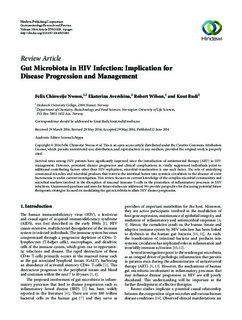Gut Microbiota in HIV Infection: Implication for Disease Progression and Management
Journal article, Peer reviewed
Permanent lenke
http://hdl.handle.net/11250/276723Utgivelsesdato
2014Metadata
Vis full innførselSamlinger
Originalversjon
Nwosu, F., Avershina, E., Wilson, R. C. & Rudi, K. (2014). Gut microbiota in HIV infection: Implication for disease progression and management. Gastroenterology Research and Practice, 2014. doi: http://dx.doi.org10.1155/2014/803185 10.1155/2014/803185Sammendrag
Survival rates among HIV patients have significantly improved since the introduction of antiretroviral therapy (ART) in HIV management. However, persistent disease progression and clinical complications in virally suppressed individuals point to additional contributing factors other than HIV replication; microbial translocation is one such factor. The role of underlying commensal microbes and microbial products that traverse the intestinal lumen into systemic circulation in the absence of overt bacteraemia is under current investigation. This review focuses on current knowledge of the complex microbial communities and microbial markers involved in the disruption of mucosal immune T-cells in the promotion of inflammatory processes in HIV infections. Unanswered questions and aims for future studies are addressed. We provide perspective for discussing potential future therapeutic strategies focused on modulating the gut microbiota to abate HIV disease progression.
Beskrivelse
This is an open access article licensed under the Creative Commons Attribution 3.0 Unported (CC BY 3.0) and originally published in Gastroenterology Research and Practice. You can access the article on publisher's website by following this link: http://www.hindawi.com/journals/grp/2014/803185/
